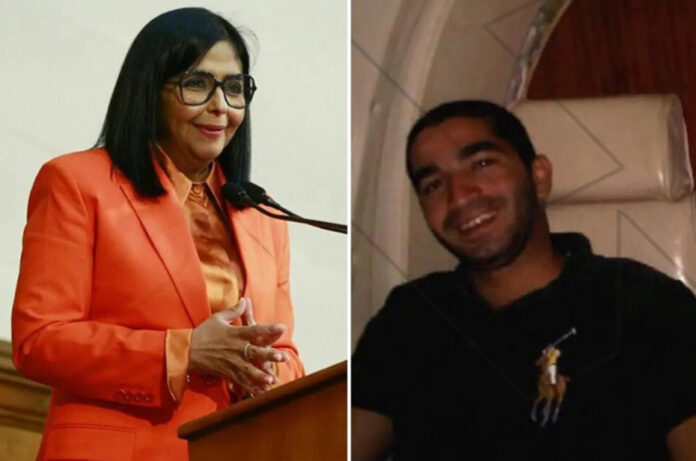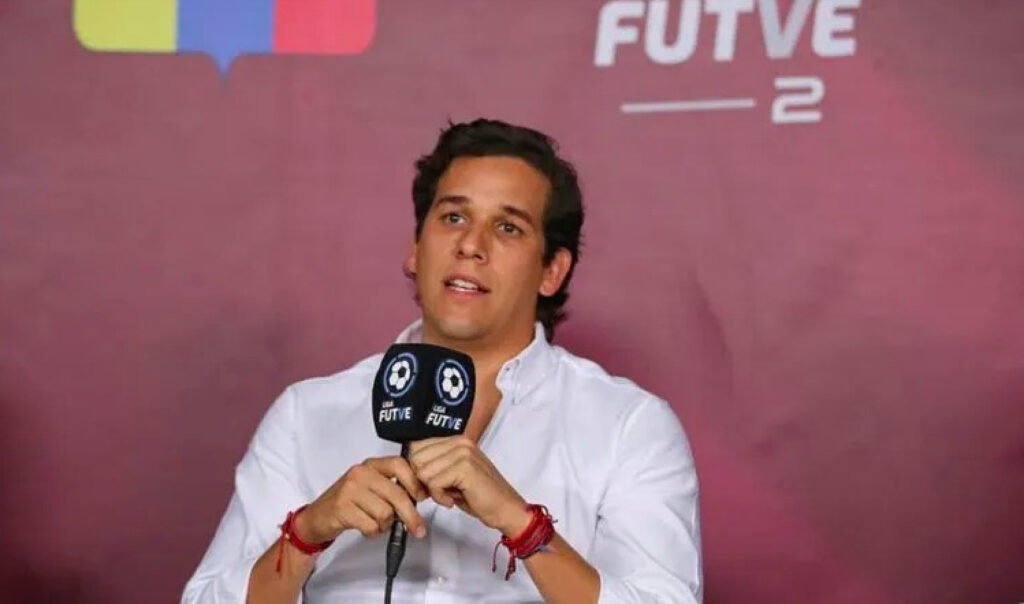 Delcy Rodríguez, Vice President of Venezuela, alongside her partner Yussef Abou Nassif, a key supplier of goods and services under the Maduro regime.
Delcy Rodríguez, Vice President of Venezuela, alongside her partner Yussef Abou Nassif, a key supplier of goods and services under the Maduro regime.
The latest power struggle within the Maduro elite clearly showcases one winner: the Vice President.
In March, the little-known National Anti-Corruption Police (PNAC) and the “Attorney General’s Office” announced the dismantling of a corruption network within PDVSA, comprised of “officials who, abusing their position and authority, allegedly executed parallel oil operations to PDVSA.”
Tarek William Saab relayed the official version regarding the new “discovered” corruption scheme at PDVSA. Members of the network were accused of misappropriation of public assets and money laundering. At that time, Saab did not disclose the amount of the theft but mentioned a loss of up to $24 billion from PDVSA’s funds, equivalent to two years of the national budget. However, this figure remains unverified, likely because even the regime is unaware of the exact extent.
Saab identified the supposed members of the scheme, naming Lt. Colonel Antonio Pérez Suárez, Vice President of Commerce and Supply at PDVSA, as its leader. The network reportedly consisted of ten officials and eleven businessmen, some of whom were detained, while others remain at large. In recent months, several detainees, such as contractor Bernardo Arosio Hobaica, have been released under restrictive measures.
Most of those mentioned by Saab were part of Tareck El Aissami’s inner circle; however, he was not singled out by the “prosecutor.” The Monday following Saab’s statements, El Aissami resigned from the Ministry of Oil “to facilitate the investigation,” according to the announcement.
Since then, nothing has been disclosed regarding the fate of Maduro’s super minister. Rumors suggest he is under residence arrest within Fort Tiuna – the bunker for Maduro’s elite – or even on La Orchila island.
With El Aissami’s disappearance, control of PDVSA has shifted to Vice President Delcy Rodríguez.
Complete Control
The investigation, while opaque like all actions of the regime, has revealed a new picture of corruption in PDVSA, highlighting the connection with cryptocurrencies, which are allegedly used to evade international sanctions blamed for Venezuela’s economic collapse, according to official narratives.
The modus operandi of such a theft from public coffers is intricate. Amid a lack of oversight and transparency, and to avoid international sanctions, PDVSA sold oil to the business associates via a scheme known as “compensation.” This involved bartering oil for food or public works, among other state necessities. Transactions included discounts of up to 40%, citing risks from sanctions. In some situations, operations were completed with advance payments, allowing buyers to inspect products, based on which prices and commissions were negotiated. Once agreed, crude oil was loaded onto vessels – mostly rented tankers with tracking systems (AIS) turned off, aimed for resale to oil companies in China, Indonesia, or India, among others.
The most complex aspect of these transactions was facilitating payments without using the international banking system and without the backing of insurance companies. The solution adopted was the use of cryptocurrencies. The system became a black hole that consumed vast amounts without returning anything substantial to PDVSA. Within this convoluted web, the involved “entrepreneurs” and public employees profited immensely. Reports indicate that some pseudo-businessmen owe PDVSA hundreds of millions of dollars.
The “red, red” destruction of PDVSA, seized by the kleptocracy and caquistocracy of Miraflores, once again highlights the sale of oil through mechanisms of total opacity, dominated by illegal activities, and complete disregard for the standards that once characterized the oil company as exemplary. The Maduro regime divided what remained of the oil pie.
Within this context, it has become evident that Tareck El Aissami’s plot was not the only one operating within PDVSA.
Vice President and Minister of Finance Delcy Rodríguez has within PDVSA a key ally in Jorge Giménez, president of the Venezuelan Football Federation, who was identified by the Public Ministry as part of the network dismantled in March. Nonetheless, he was never detained due to Delcy Rodríguez’s protection. A previous investigation in 2022 accused him, along with Alejandro Arroyo Pérez and Gilber Renee Mejias, of owning ENSA Energía AG and Logística y Alimentos El Mazo C.A., companies that handle PDVSA’s oil-for-food exchange structure supplying the CLAP program, following the 2020 detention of Alex Saab. Giménez also collaborates in the oil business with his partner Antonio González and his brothers.
 Jorge Andrés Giménez Ochoa, president of the Venezuelan Football Federation and preferred supplier of the Maduro regime.
Jorge Andrés Giménez Ochoa, president of the Venezuelan Football Federation and preferred supplier of the Maduro regime.
According to sources from PDVSA, Giménez is reportedly the company’s biggest debtor, with $1.2 billion owed through Panglobal Energy and Ripple Oil Trading. As reported by Cuentas Claras Digital, Giménez continues operating. Federico Alberto Manzo Leyba, representing Giménez’s companies, recently traveled to London negotiating significant crude shipments from PDVSA and aluminum from CVG.
However, the favored supplier and operator of the Vice President is her partner Yussef Abou Nassif, known for providing various goods and services to the public administration, allowing him to expand his business both in Venezuela and abroad. Abou Nassif and his brothers own construction businesses, tourism services, real estate companies, food importers, and packaging firms. The Abou Nassif clan secured multimillion-dollar contracts through the Local Supply and Production Committees (CLAP). Moreover, they utilize offshore jurisdictions and tax havens like Hong Kong and Panama to hide their financial activities. The Abou Nassif clan has supplanted brothers Majed and Khaled Khalil Majzoub, other favorites of the Vice President.
Media Control
Currently, Delcy Rodríguez is the most powerful person in the country, controlling PDVSA, CVG, and the so-called Mining Arc. Additionally, she wields significant influence over the regime’s communication strategy through a well-known journalist who previously worked with opposition figures and now acts as her assistant, managing information, and particularly disinformation content for numerous digital media outlets that ostensibly represent various interests but respond solely to Delcy Rodríguez’s political line and are financed by Raúl Gorrín, owner of Globovisión and El Universal.
Comparing the corruption network exposed this year at the heart of PDVSA, the common denominator with previous scandals remains clear: systemic corruption in Venezuela and Nicolás Maduro’s responsibility in the massive plundering suffered by the country. The lingering question is whether accountability for these corrupt acts that have plunged Venezuela into an unprecedented crisis will ever occur.
In addition to the dismantled group of El Aissami and Delcy Rodríguez, other factions are competing within the Maduro elite, including one led by Carlos Erik Malpica Flores and his associate Ramón Carretero Napolitano, and another involving Nicolás Maduro Guerra along with friends Ricardo and Santiago Morón and Alejandro Ceballos (alias el Nené), advised by Jimai Montiel, who manipulates powerful influences in the judicial system. In upcoming releases, we will provide more details on these individuals.
Finally, a question remains: Where is Tareck El Aissami, and when will he speak?